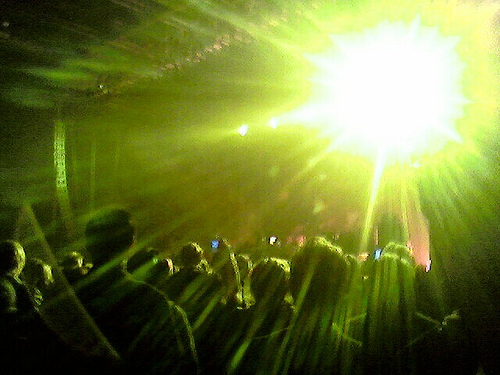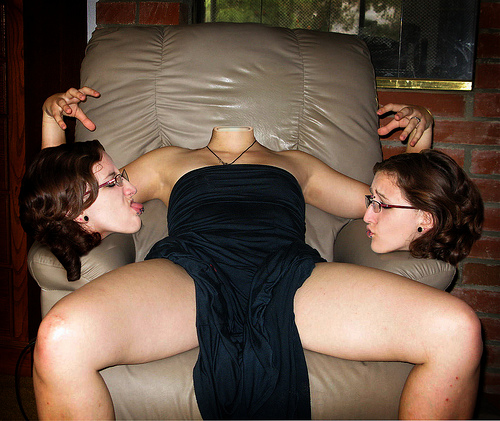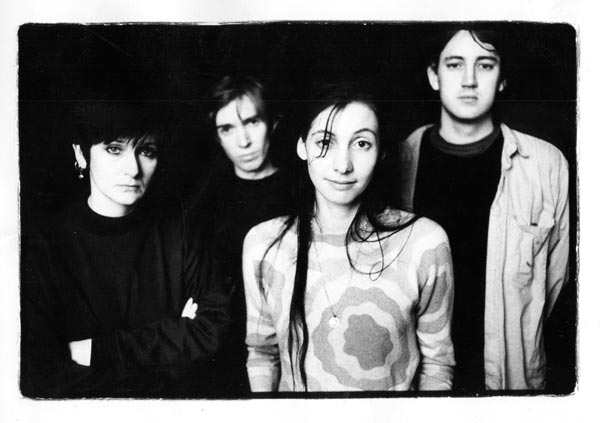
Periodically, and without any fair warning, FreeDarko turns into a music blog. Like when the Recluse and myself joined hands in celebration of ancestral favorites Polvo. Or today, roughly 24 hours after I became the last person to stand before My Bloody Valentine's reunion tour. What follows is an exchange between myself and Zac Crain, senior editor at D Magazine and author of the forthcoming Dimebag Darrell bio, Black Tooth Grin
Bethlehem Shoals: You know how everyone talks about the new Terminator movie, or The Dark Knight, as a franchise "reboot?" That's what this show was like for me. And others, I think. One friend just said to me "I feel like the band is entirely different to me now." It's true—I tried to listen to Loveless afterward to figure out the setlist, and there was zero familiarity with the music on my part. And this is a record I've listened to thousands of times. I also believe, or want to believe, that the MBVocaust was especially deadly. The sound crew were going nuts, especially some bald guy who appeared to be in charge. They were all taping it, and these dudes had been on the road with them through the whole tour (last date was tonight). I won't go into any great detail over what parts of my body were affected and how, or how satisfying it was to watch "fans" around us who wouldn't shut up before leave after five minutes. Like motherfuckers, what did you think you were getting into? Don't you know shit about their live show?
Zac Crain: Someone offered me what he termed "the best mushrooms ever" pre-show, and I wisely declined. Because I think it might have ended up looking like the opening of the ark scene from Raiders. And I can't imagine playing that shit while intoxicated in any way. I also like the fact that, of a few thousand, maybe a handful of people had seen them before, and maybe one of those people saw them back in the day. So it was totally different than seeing, say, the Pixies, where everyone had a memory to stack it up against, or you really felt you were getting less than you might have back in the day. Totally fresh. I think reboot more or less nails it, because it was new. You weren't seeing the old band, or the the band on the record, but you weren't getting a rehash necessarily either.
BS: A friend of mine feels that Loveless once and for all destroyed the possibility of album-live performance correlation. I'd take it even further—that album's vastly human, but who ever thinks it was made by people with bodies? Even the erotics of them are soft-focus: sleeping, dreaming, bathing in sound without any punk-like penetration. Or emotions that go past the womb or certain altered states. It's like ghosts' wet dreams. Live, though, they're the polar opposite: Rock performance at its most raw and elemental. The ballad-ic songs barely existed in that context (at all, or when they were played). Then the onslaught at the end, which was like stripping their live ethos down to the bare essence. And look what you get. So basically, they're the end of rock on two different extremes of the spectrum.

ZC: I listened to Loveless the next day, and it's sort of like a tape loop of the echo of the show in my head as I was driving home, but not as pejorative as that probably sounds. But, yeah, it's not the same. It's like the difference between a jet stream and an actual jet. The MBVocaust, to me, is sort of the combine harvester of rock shows, separating the people who were there for the music and the people who were there just to be there. I was about maybe 30 feet back. People were streaming past me to leave, but just as many were streaming past me to get closer. I enjoyed that. I can't, even in my mind, completely recreate what it felt/sounded like, but I did notice when I was leaving that I felt it physically way more than anything I can remember.
BS: To me, it wasn't a question of there for the music vs. there for the event, but more "there to hear Loveless really fucking loud" vs. "people who have really spent time with this music."
ZC: Weird thing for me is I grew up in intensely small town Texas. So I had no idea about them until they were well and truly dead, or it seemed so. And then there was so much catching up to do with other stuff, I really didn't listen to MBV until really really late. And then that's all I listened to, for a time. So this wasn't really ancient to me. It was more like a band that hadn't toured in like, maybe, six or seven years. (I kind of did everything backwards or mixed up or something: hip-hop was my high school punk rock, then punk rock was my punk rock, then Britpop, then nothing but Stax/Volt, and somewhere in that game of Twister I spun "left hand, MBV.") So last Wednesday I expected to be monumental, then I was worried it wouldn't be, then it was way more than I thought it would be originally.
BS: One thing I thought halfway through is "wait, what exactly makes for an MBV 'fan'?" There's so little music. Like three CD-R's of rarities. And I don't think your experience with them (which sounds a lot like mine) is uncommon, or somehow lesser than . . . that one guy who saw them in 1991? If anything, there's a way in which you can listen to them as a totally dated band; getting into them later, when they've taken on legendary status, and realizing how easy/essential it is to do so, emphasizes just how colossal they are. Like, who says "you weren't listening to Coltrane in 1965!" God doesn't belong to anyone in particular, does he? Or some people more than others?
ZC: That's a good point. There's really not as much to grab onto, musically, as with other bands that have that stature, though I guess someone like the Stone Roses would have a similar situation should they ever get back together. It's funny looking back -- because that's mostly what I have to do with the bands I really like -- and they 1) weren't together as long as you think and 2) didn't record as much either. The deal with MBV is that part of what they did has been so bastardized -- by bands, and by critics describing those bands -- that until they started playing again, it was less a band than an idea, but an idea no one really remembered anymore, or remembered really imprecisely. Sort of like a scene from a movie you talk about with your friends all the time but never actually watch, and so, the dialogue gets botched, and then screwed up even more, and on and on. When you actually watch the movie, the scene is as great as you remembered, but not anything at all how you remembered it, if that makes any sense.

BS: I would almost say that the "I saw them in 1991" dudes become part of that hazy past. So someone says that to your face and they automatically start to dissipate a little. They become part of the legend: "those fans that heard the sound." Weird that the sheer physicality of their past live shows had become as elusive, as much of an idea, as "Loveless" was the day it was released. As opposed to, say, the time I went to Sonic Youth in 1996 and some middle-aged black dude with a Confusion is Sex tee tucked into acid-washed jeans just kept glaring at everyone.
ZC: Elusive is a good word because I can't remember the last time I went to a show where so many people didn't know exactly what to expect. At best you have someone who went to a show in another city, but they don't give you much. The sense beforehand was more than nervousness, less than fear. "Can I handle this?" was part of it, but more than that it was "How do I want to handle this? What are they/am I capable of?" Can't think of anyone else that can do that. There are bands that are sort of wildly different from record to stage and back, but even those bands, like I suppose people would consider Radiohead to be one, are wildly different in kind of predictable ways. I think MBV is permanently other. It's whatever you want it to be, but it is also none of those things exactly, and probably never will be.
BS: This goes back, as do all things in life, to the MBVocaust. If some noise band had just come out swinging with that, I would've left. But to have that as the culmination of a set that contained so many emotions, and contrasts, and history, made it well-earned. Wait, that's such a dispassionate way of looking at it. It was both laying all that to waste and boiling it down to its essence. Like the world ending so it could start over again. I really have no idea how something so stupid and obvious could be so profound. Actually, I do: If a band of unparalleled artistic excellence did it after a great set that came after almost twenty years of build-up. Catharsis shouldn't be complicated, just the circumstances surrounding it.

As a bonus, here's David Wingo's "Macrophenomenal Anthem," which only really began to take shape when MBV-mania swept New York last fall.















No comments:
Post a Comment